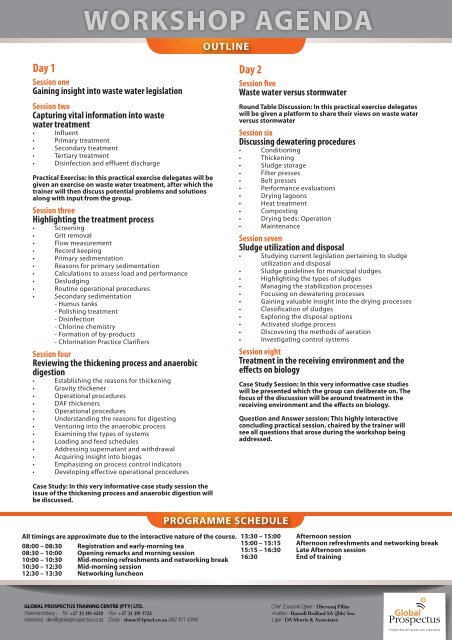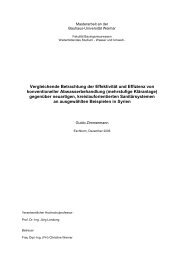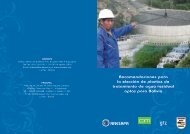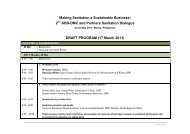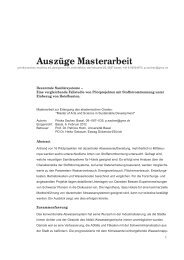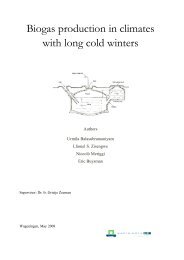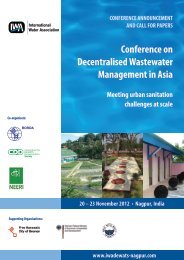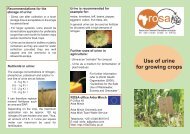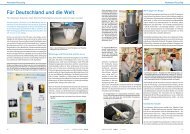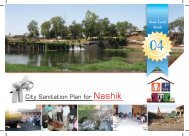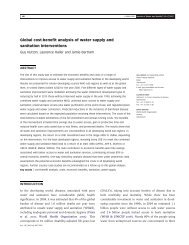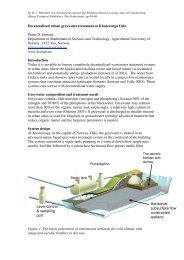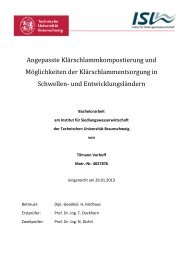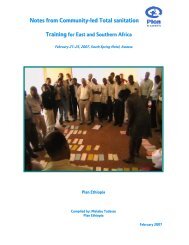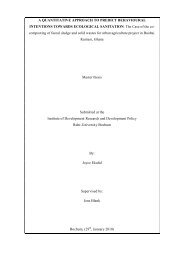2nd Annual Biological Processing of Waste Water ... - SuSanA
2nd Annual Biological Processing of Waste Water ... - SuSanA
2nd Annual Biological Processing of Waste Water ... - SuSanA
You also want an ePaper? Increase the reach of your titles
YUMPU automatically turns print PDFs into web optimized ePapers that Google loves.
OUTLINE<br />
Day 1<br />
Session one<br />
Gaining insight into waste water legislation<br />
Session two<br />
Capturing vital information into waste<br />
water treatment<br />
• Influent<br />
• Primary treatment<br />
• Secondary treatment<br />
• Tertiary treatment<br />
• Disinfection and effluent discharge<br />
Practical Exercise: In this practical exercise delegates will be<br />
given an exercise on waste water treatment, after which the<br />
trainer will then discuss potential problems and solutions<br />
along with input from the group.<br />
Session three<br />
Highlighting the treatment process<br />
• Screening<br />
• Grit removal<br />
• Flow measurement<br />
• Record keeping<br />
• Primary sedimentation<br />
• Reasons for primary sedimentation<br />
• Calculations to assess load and performance<br />
• Desludging<br />
• Routine operational procedures<br />
• Secondary sedimentation<br />
- Humus tanks<br />
- Polishing treatment<br />
- Disinfection<br />
- Chlorine chemistry<br />
- Formation <strong>of</strong> by-products<br />
- Chlorination Practice Clarifiers<br />
Session four<br />
Reviewing the thickening process and anaerobic<br />
digestion<br />
• Establishing the reasons for thickening<br />
• Gravity thickener<br />
• Operational procedures<br />
• DAF thickeners<br />
• Operational procedures<br />
• Understanding the reasons for digesting<br />
• Venturing into the anaerobic process<br />
• Examining the types <strong>of</strong> systems<br />
• Loading and feed schedules<br />
• Addressing supernatant and withdrawal<br />
• Acquiring insight into biogas<br />
• Emphasizing on process control indicators<br />
• Developing effective operational procedures<br />
Day 2<br />
Session five<br />
<strong>Waste</strong> water versus stormwater<br />
Round Table Discussion: In this practical exercise delegates<br />
will be given a platform to share their views on waste water<br />
versus stormwater<br />
Session six<br />
Discussing dewatering procedures<br />
• Conditioning<br />
• Thickening<br />
• Sludge storage<br />
• Filter presses<br />
• Belt presses<br />
• Performance evaluations<br />
• Drying lagoons<br />
• Heat treatment<br />
• Composting<br />
• Drying beds: Operation<br />
• Maintenance<br />
Session seven<br />
Sludge utilization and disposal<br />
• Studying current legislation pertaining to sludge<br />
utilization and disposal<br />
• Sludge guidelines for municipal sludges<br />
• Highlighting the types <strong>of</strong> sludges<br />
• Managing the stabilization processes<br />
• Focusing on dewatering processes<br />
• Gaining valuable insight into the drying processes<br />
• Classification <strong>of</strong> sludges<br />
• Exploring the disposal options<br />
• Activated sludge process<br />
• Discovering the methods <strong>of</strong> aeration<br />
• Investigating control systems<br />
Session eight<br />
Treatment in the receiving environment and the<br />
effects on biology<br />
Case Study Session: In this very informative case studies<br />
will be presented which the group can deliberate on. The<br />
focus <strong>of</strong> the discussion will be around treatment in the<br />
receiving environment and the effects on biology.<br />
Question and Answer session: This highly interactive<br />
concluding practical session, chaired by the trainer will<br />
see all questions that arose during the workshop being<br />
addressed.<br />
Case Study: In this very informative case study session the<br />
issue <strong>of</strong> the thickening process and anaerobic digestion will<br />
be discussed.<br />
PROGRAMME SCHEDULE<br />
All timings are approximate due to the interactive nature <strong>of</strong> the course.<br />
08:00 – 08:30 Registration and early-morning tea<br />
08:30 – 10:00 Opening remarks and morning session<br />
10:00 – 10:30 Mid-morning refreshments and networking break<br />
10:30 – 12:30 Mid-morning session<br />
12:30 – 13:30 Networking luncheon<br />
13:30 – 15:00 Afternoon session<br />
15:00 – 15:15 Afternoon refreshments and networking break<br />
15:15 – 16:30 Late Afternoon session<br />
16:30 End <strong>of</strong> training<br />
GLOBAL PROSPECTUS TRAINING CENTRE (PTY) LTD.<br />
Pietermaritzburg - Tel: +27 33 391 4229 Fax: +27 33 391 5722<br />
Marketing - dev@globalprospectus.co.za Design - shane@1pixel.co.za (082 871 4394)<br />
Chief Executive Oer - Dhevaraj Pillay<br />
Auditors - Russell Bedford SA (Jhb) Inc.<br />
Legal - DA Morris & Associates


